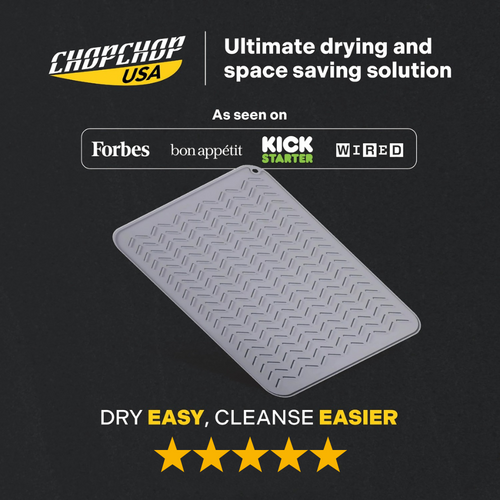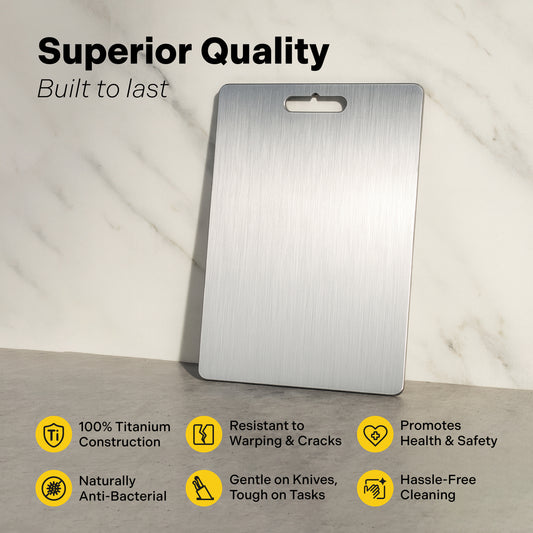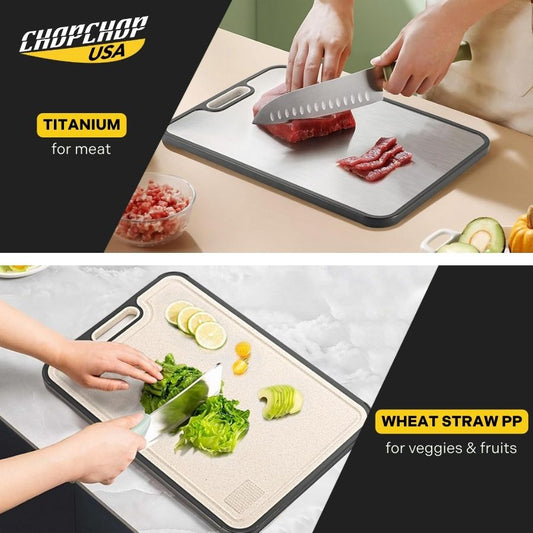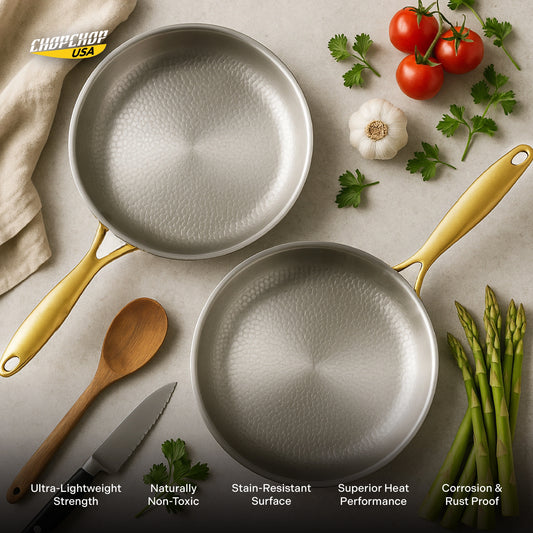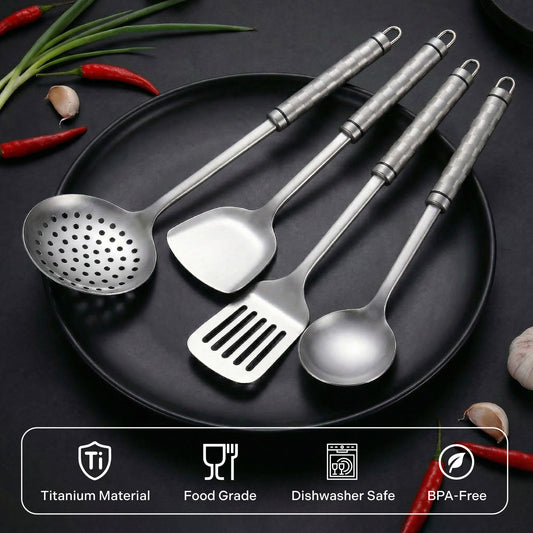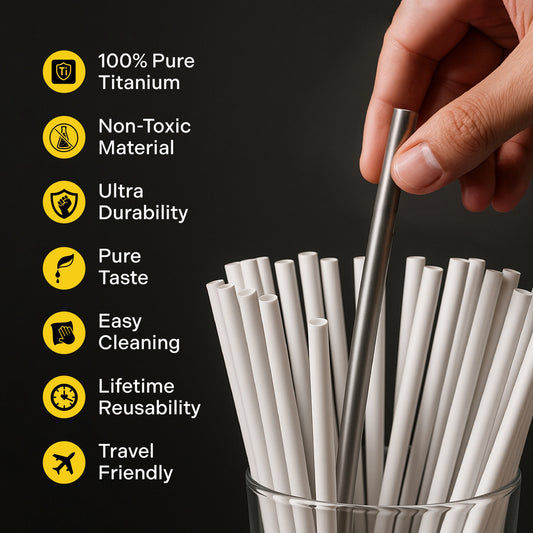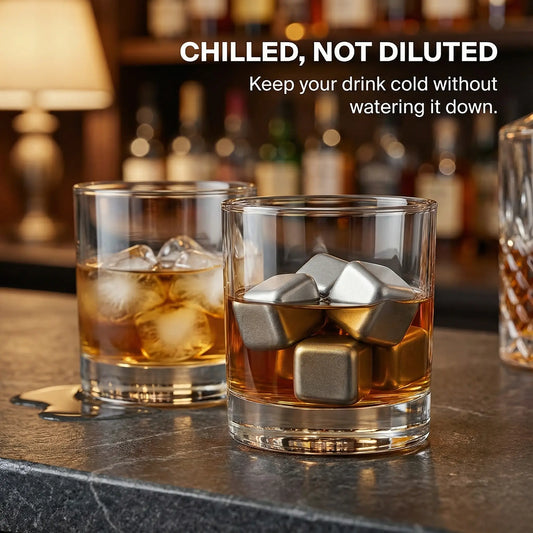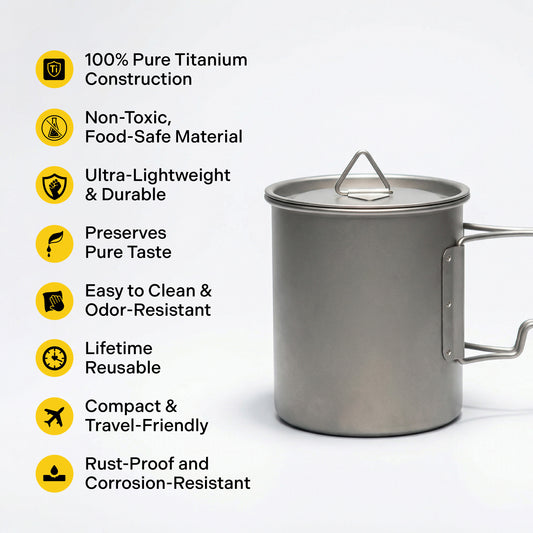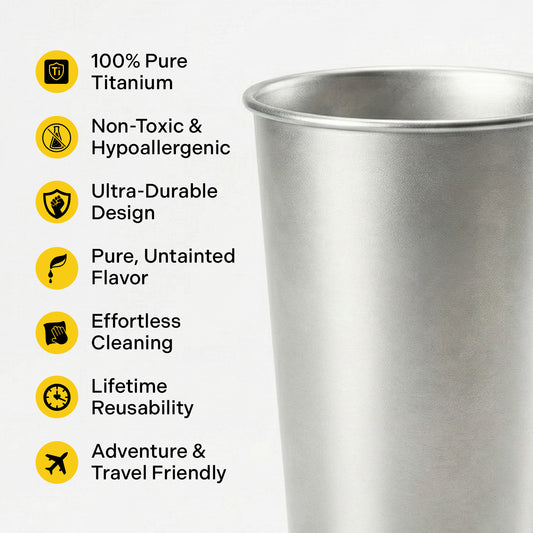Titanium is a remarkable metal known for its strength, corrosion resistance, and lightweight properties. While it was once a rare and expensive element, modern advancements have made it more accessible and useful in various industries, including cookware. Nowadays, titanium is considered as one of the Best Cutting Board Material For Your Health 2025. This article explores the history of titanium, detailing when titanium was discovered, how it was found, who discovered titanium, and its applications in modern cookware.
How Was Titanium Discovered? When Was the Element Titanium Discovered?

Titanium was discovered in 1791 by Reverend William Gregor, an amateur geologist from England. While studying black sand deposits in Cornwall, Gregor identified an unknown metal within the mineral ilmenite. He initially named it "manaccanite," after the village of Manaccan, where it was found. However, in 1795, German chemist Martin Heinrich Klaproth independently rediscovered the element and renamed it titanium, inspired by the Titans of Greek mythology due to its remarkable strength.
How Was Titanium Made?
Although titanium was discovered in the late 18th century, extracting and refining it into a pure metal proved difficult. The first successful extraction process was developed in 1910 by Matthew A. Hunter, an American metallurgist. He used sodium to reduce titanium tetrachloride (TiCl4), producing pure titanium metal for the first time.
In 1932, the Kroll Process, developed by William Kroll, revolutionized titanium production. This method replaced sodium with magnesium, making it more cost-effective and efficient, paving the way for titanium's widespread industrial use.
Benefits of Titanium

Titanium is widely used due to its exceptional strength, durability, and resistance to corrosion. This unique metal offers a range of benefits, making it an ideal choice for various industries. Some of the key advantages of titanium include:
Lightweight but Strong
Titanium boasts a strength comparable to steel but is approximately 45% lighter. This makes it an excellent material for applications where weight reduction is crucial, such as aerospace engineering, medical devices, and cookware.
Corrosion Resistance
Unlike other metals, titanium does not rust or corrode when exposed to moisture, salt, or acidic environments. This property makes it highly desirable for marine applications, medical implants, and outdoor structures.
Non-Toxic & Biocompatible
Titanium is entirely safe for human contact, making it an excellent choice for medical implants like hip replacements, dental implants, and surgical tools. Additionally, it is non-reactive with food, ensuring safety in cookware and kitchenware.
High Heat Resistance
Titanium has a high melting point and withstands extreme temperatures without losing its structural integrity. This makes it ideal for applications that require exposure to intense heat, such as jet engines, industrial equipment, and high-performance cookware.
Non-Reactive
Unlike some metals, titanium does not leach chemicals or metallic tastes into food. This property ensures that cookware made from titanium remains safe and does not alter the flavor of food.
Where Is Titanium Used?

Due to its superior properties, titanium is utilized across a variety of industries. Some of the primary applications of titanium include:
- Aerospace – Titanium is extensively used in aircraft structures, spacecraft, and jet engines due to its strength, lightweight nature, and resistance to extreme conditions.
- Medical – Found in surgical implants, prosthetics, and dental applications, titanium's biocompatibility ensures safety and longevity in medical procedures.
- Automotive – Used in high-performance and luxury vehicles, titanium helps reduce weight while maintaining structural integrity, improving fuel efficiency and performance.
- Sports Equipment – Titanium is a preferred material for bicycles, golf clubs, tennis rackets, and other sporting goods due to its lightweight and durable nature.
- Construction – Found in buildings, bridges, and structural components, titanium provides strength and longevity while resisting environmental damage.
- Kitchenware & Cookware – Increasingly popular in high-end cookware, titanium is valued for its non-reactive, durable, and heat-resistant properties.
Titanium Cookware: A Modern Kitchen Essential

One of the most exciting applications of titanium is in cookware. Many people wonder, Is titanium safe for cookware? The answer is a resounding yes! Titanium cookware is considered one of the safest options available due to its non-toxic and non-reactive nature. Here are some of the key benefits:
Non-Toxic & Safe
Unlike aluminum or certain non-stick coatings, titanium does not react with acidic or alkaline foods, ensuring that no harmful substances leach into meals.
Lightweight & Durable
Titanium cookware is significantly lighter than traditional stainless steel options, making it easier to handle while maintaining superior strength and longevity.
Scratch & Corrosion Resistant
Resistant to damage, titanium cookware maintains its quality over time, even with frequent use.
Easy Maintenance
The non-porous nature of titanium makes cleaning effortless, as food particles do not easily adhere to the surface.
Other Titanium Kitchen Products
In addition to cookware, titanium is used in a variety of kitchen tools and accessories, offering long-lasting performance and convenience. Some popular titanium kitchen products include:
- Titanium Knives – Ultra-light, exceptionally sharp, and highly resistant to rust and corrosion, titanium knives are favored by professional chefs and outdoor enthusiasts alike.
- Titanium Cutlery – Ideal for camping, travel, and outdoor dining, titanium cutlery is lightweight, durable, and easy to clean.
- Titanium Water Bottles – BPA-free and resistant to corrosion, titanium water bottles provide a safe, eco-friendly alternative to plastic and stainless steel options.
- Titanium Camping Gear – Used for outdoor cookware, utensils, and portable cooking stoves, titanium gear is valued for its lightweight and heat-resistant properties.
- Titanium Cutting Boards – Are Titanium Cutting Boards Safe? The answer is Yes. Durable, easy to clean, and resistant to bacterial buildup, titanium cutting boards provide a high-quality surface for food preparation.

One of the leading brands of titanium cutting boards is ChopChop USA. Known for the innovative designs and commitment to quality, ChopChop USA produces cutting boards that are lightweight, resistant to stains, and exceptionally durable. Our products are favored by professional chefs and home cooks looking for a hygienic and long-lasting kitchen solution.
See more: ChopChop Titanium Cutting Board Review – Is It Worth It?
ChopChop™ USA 100% Pure Titanium Cutting Board | New Year Sale
Limited-Time Offer — Get Free GiftsConclusion
Titanium has come a long way from its discovery in 1791 to becoming an essential material in modern cookware. Thanks to its strength, durability, and safety, it is a preferred choice for professional chefs and home cooks alike. If you are considering investing in titanium cookware, rest assured that it is one of the safest and most durable options available today.
By understanding the history of titanium, how it was discovered, and its many benefits, we can appreciate its importance in various industries and especially in our kitchens.
If you have any questions about ChopChop USA's products or promotions, please feel free to contact us at support@chopchopusa.com. Our dedicated team is available 24/7 and always happy to assist you.


